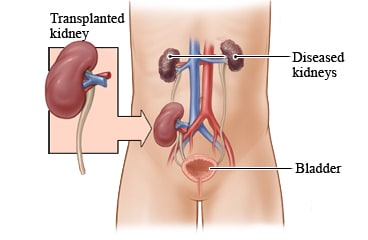What is a kidney transplant?

A kidney transplant gives you a healthy kidney from another person. You may need a transplant if your kidneys work poorly because of diabetes, high blood pressure, or another illness.
You need only one kidney to live. The new kidney can do the work that your own kidneys can't do. It will remove waste from your blood. It will keep your body's fluids and chemicals in balance. You are likely to feel better and have more energy.
You have to meet certain rules to be able to get a kidney. For example, your overall health (other than kidney problems) has to be good. Before you have a transplant, you will need to have tests to see how well your body will accept the new kidney.
Getting a new kidney can take a long time. If you're getting your kidney from a living donor, you may not have to wait long. Or your name is put on a waiting list for a donor kidney from a person who has died.
How is a kidney transplant done?
If a relative or another living person gives you a kidney, you can plan your surgery. But if you're on a waiting list to get a kidney from a person who has died, your surgery could happen very suddenly. When a donor kidney is available, you will probably have surgery within 36 hours.
The doctor will make a cut (incision) in your lower belly. The donated kidney will be placed in your lower belly. Then the blood vessels of the new kidney will be connected to your blood vessels. Then the doctor will connect the ureter of the new kidney to your bladder. (A ureter is the tube that carries urine from the kidney to the bladder.) Your own kidneys will not be taken out unless they are causing problems.
The incision is closed with stitches or staples. These will be removed about 1 to 2 weeks after surgery. The incision will leave a scar that will fade with time.
You may stay in the hospital several days.
What can you expect after a kidney transplant?
Within a few days, you may start to feel much better than you did before. But you may have some pain or soreness in your belly or side. This can last for several weeks.
Most people go home from the hospital within several days after surgery. It will probably take several weeks or longer before you can get back to your job or usual activities.
After surgery, the new kidney will start to do the work that your own kidneys cannot. It will remove waste from your blood. It will keep your body's fluids and chemicals in balance. Your new kidney may start working very soon after surgery. Or it may take a few weeks. If your kidney doesn't start to work right away, you will need to have dialysis until the new kidney can take over.
After the transplant, you'll have to take medicines every day from now on. The medicines will help keep your body from rejecting the new kidney. They will also make your immune system weaker. This means you will be more likely to get an infection or become sick. To reduce your risk of infection, wash your hands often. Stay away from crowds of people, and avoid contact with people who have a cold or the flu.
You may have many different emotions after your kidney transplant. Seek out family, friends, and counselors for support. If you think you are depressed, ask your doctor for help. Treatment can help you feel better.
Follow-up care is a key part of your treatment and safety. Be sure to make and go to all appointments, and contact your doctor if you are having problems. It's also a good idea to know your test results and keep a list of the medicines you take.
Where can you learn more?
Go to http://www.healthwise.net/patientEd
Enter R541 in the search box to learn more about "Learning About Kidney Transplant Surgery".
Current as of: January 7, 2025
Author: Ignite Healthwise, LLC Staff
Clinical Review Board
All Ignite Healthwise, LLC education is reviewed by a team that includes physicians, nurses, advanced practitioners, registered dieticians, and other healthcare professionals.

